Arun Sudhaman 30 Mar 2020 // 9:19AM GMT

77% of PR firms across the world expect the Covid-19 pandemic to cause a loss of earnings as communications budgets decline, according to a global industry survey carried out by PRovoke Media, ICCO and research platform Stickybeak last week.
The study, which attracted 393 responses (including 105 in-house executives) from across the globe, suggest a relatively bleak forecast for the PR industry's prospects — as it grapples with cancelled campaigns, consumer marketing budget cuts, hiring freezes and payment delays.
.png)
When asked how Covid-19 is expected to impact their PR firms, loss of earnings accounted for more than three-quarters of responses, ahead of hiring freezes (62%) and well beyond pay cuts (37%) and layoffs (27%). Only 15% of responses expect increased business from the global pandemic, but 35% do report that clients are increasing agency work in response to the pandemic (see Q8 below).
While 48% of in-house respondents expect their communications budget to hold steady over the next year, 35% think it will decrease. Only 17% expect an increase in communications spend.
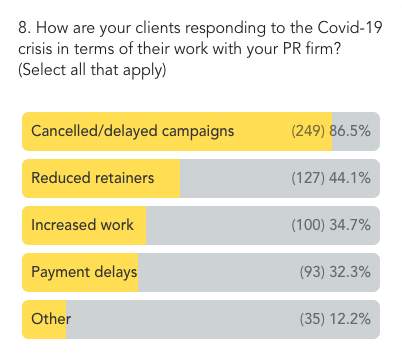
So far, according to agency respondents, the downturn is resulting mostly in delayed/cancelled campaigns (87%), rather than reduced retainers (44%) and payment delays (32%).
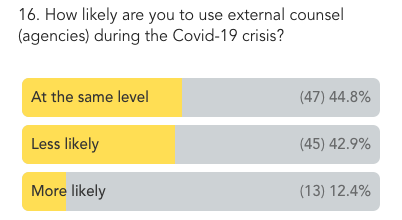
Encouragingly, agencies report that there is some increased work (35%) on offer. However, in-house executives do not appear to share this sentiment. 43% say they are less likely to use external counsel (agencies) during this crisis, compared to only 12% who are more likely.
When it comes to the specific services that clients are seeking and/or reducing from their PR firms, there is some degree of accordance between agency and in-house respondents. Agencies select crisis counsel (82%) and corporate comms (72%) as the top two services clients are seeking from them right now, ahead of employee engagement (51%).
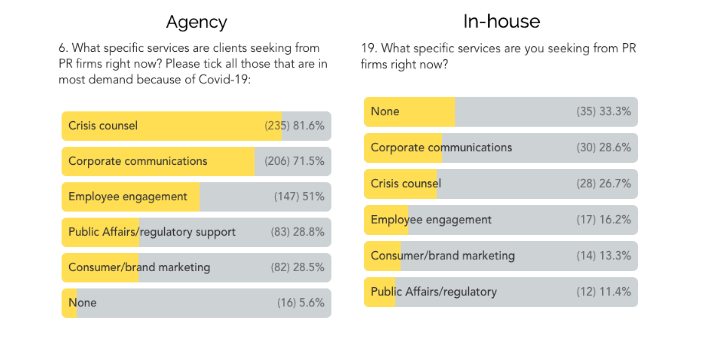
Clients also selected crisis and corporate comms within the top three services they are seeking from PR agencies; worryingly, though, "none" was the top choice.
2f909f4a918367d3ac1bff0000c9ebb1.png)
However, "none" (53%) also came out on top when clients are asked which services they are reducing from PR firms, ahead of consumer/brand marketing (31%). Agencies also report consumer/brand marketing as hardest hit (78%), well ahead of other services that clients are reducing.
"Those PR people at the centre of trying to help companies, organisations and governments work through what is the most profound crisis most of us have experienced have probably never been busier, more stressed or more needed," said Stickybeak co-founder David Brain, who previously led Edelman APACMEA. "Those on the periphery of that decision making and those involved in marketing are probably a lot less busy, through no fault of their own, and so are perhaps feeling a different kind of stress."
"Looking at our figures I feel particularly sorry for agency people and especially those in the consumer brand area. Seeing revenue shrink through no fault of your agency and having to face the consequences of that is very hard."
"I believe that the industry will find a way to overcome these hurdles and become stronger and more relevant over time," added Nitin Mantri, ICCO president. "Communications has become a business-critical need, with clients approaching firms to work on their crisis and corporate comms, and employee engagement. 82% of the agencies surveyed said brands were reaching out to them for crisis counsel and contingency plans for their campaigns while over half the in house professionals surveyed said they wouldn’t cut any budgets at this stage."
"Right now in this unprecedented world of Covid-19, we should therefore just focus on providing excellent, uninterrupted service for our clients," continued Mantri. "At the core, our role will be to guide brands in how they can help communities in crisis."
Covid-19 communications
Both agency (74%) and in-house (67%) report timeliness as the most important factor in effective Covid-19 communications, amid broad agreement on the critical elements for current engagement plans. There was also significant support for 'communicating and updating policies', 'being prepared for the unexpected' and 'tone and language of messaging'. Interestingly, there was far more support for 'correcting misinformation' among agencies (41%) than clients (26%).
"Often, the timeliness of messages is held up in workflow and feedback loops which is frustrating not only for employees expecting to hear the latest information quickly, but also for the communication team delivering the message," said one in-house respondent.
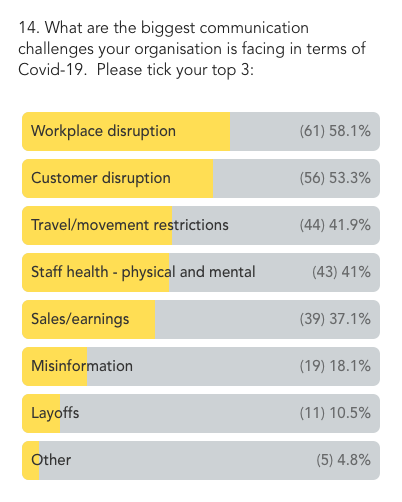
Meanwhile, clients point to workplace disruption (58%) as their top Covid-19 communications challenge, narrowly ahead of customer disruption (53%). Other issues attracting significant attention are travel/movement restrictions, mental and physical staff health, and sales/earnings. Neither misinformation (19%) nor layoffs (11%) are pressing challenges for in-house comms execs right now.
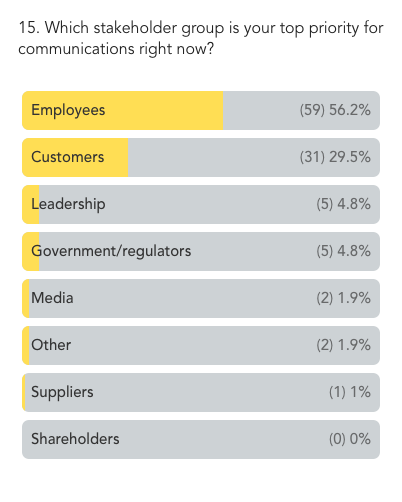
Unsurprisingly, in-house respondents select employees as the top priority for corporate communications right now (56%), ahead of customers (30%). Will that remain the case in the days to come?
Preparedness & skills
Almost two-thirds of agency respondents (62%) believe they are 'completely prepared' when it comes to having the technology in place for new ways of working. Only 1.7% are unprepared. On a similar note, 57% of in-house respondents say their communications function is either very or somewhat prepared for Covid-19, compared to just 13% who admit they were not prepared.
And almost 70% of in-house respondents believe their communications teams have the skills required to handle the challenges posed by the Covid-19 pandemic. Almost a third (31%) are very confident of this, while one-quarter are neutral. Barely 6% are not confident that they have the right communication skills in place.



































.jpg)















